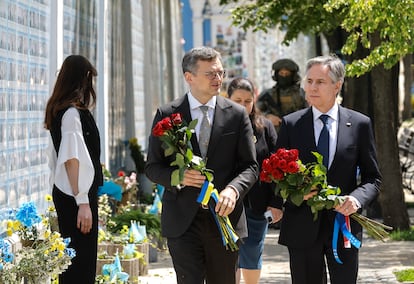Alarmed by Russia’s progress, US tries to accelerate shipment of anti-aircraft systems to Ukraine
Washington is looking to send Patriot batteries, says Secretary of State Antony Blinken at the end of his visit to Kyiv


The announcement that the president of Ukraine, Volodymyr Zelenskiy, was suspending all his trips abroad in the coming days has increased Washington’s concern about the progress of the war in that country and the exhaustion of Ukrainian forces. Russian troops entered a Ukrainian border town in the Kharkiv region just as U.S. Secretary of State Antony Blinken ended his two-day visit to Kyiv, in which he addressed the most pressing needs of the allied country in the face of an emboldened Kremlin.
A month after the U.S. Congress approved more than $60 billion in aid for Ukraine following months of delays, concern is growing in Washington about the progress that Russia has made, as well as the shortage of soldiers and weapons that plague the Ukrainian forces. The Joe Biden administration is studying ways to accelerate the delivery of weapons and replace spent ammunition and equipment destroyed during the almost half-year hiatus in which aid shipments were almost non-existent.
“Russia has continued to push the envelope in terms of just the brutality and intensity of its campaign. It has sought more targets across a wider range of Ukraine,” said National Security Advisor Jake Sullivan this week at a press conference. “We have started moving air defense to them. We intend to move more in. And by ‘we,’ I don’t just mean the U.S. I mean our whole coalition, with the President, [Defense] Secretary [Lloyd] Austin, myself working day in, day out to coordinate those deliveries and to put Ukraine in a position where it is better able to defend against what Russia is throwing at them. And what they are throwing at them is quite considerable.”
Before his departure from Kyiv, Blinken confirmed that the United States is examining how to send additional air defense systems to Ukrainian forces, including Patriot missiles. Systems are especially necessary in the area around Kharkiv, the country’s second-largest city, where, since last week, Russia has opened a new front to force Ukraine to divide its resources even further.
“One of the things I do every single day is talk to at least one ally, if not multiple, about getting more Patriot batteries into Ukraine. And I think we recently had some good news from an ally about getting one in. We’re working on more. That’s just something that we’re going to continue to try to procure,” said Sullivan. “And beyond Patriots, we’re looking for other systems.”
Ukraine has requested at least two Patriot missile batteries, costing approximately $1 billion each, to defend Kharkiv. The United States, which in 2022 announced that it would send one of these systems, is considering sending another one, according to Bloomberg, and it is contacting its allies to increase that supply. Germany promised to send one of those systems last month. A Patriot system includes radars and control stations to identify, track and engage enemy weaponry, including launch vehicles and support vehicles, with missiles.
On Tuesday, in a speech in the Ukrainian capital, Blinken had assured that “Patriots and other sophisticated air defenses — they do more than protect soldiers and save civilian lives. They create umbrellas of safety under which Ukrainian workers and entrepreneurs can adapt, innovate, build, and attract more foreign investment. That’s why we’re working relentlessly with allies and partners to procure more air defense, and to do it fast.”
The U.S. government has indicated that part of the aid approved in April is already reaching Ukraine. Among the equipment that has already received the approval are long-range ATACMS missiles, capable of hitting a Russian target anywhere in Ukraine.
According to Washington’s assessment, the intensification of the Russian offensive is due precisely to Moscow’s desire to achieve the maximum possible advantage before the flow of weapons from the United States recovers the pace of the first 18 months of the war.
“We are doing everything we can to accelerate assistance,” Blinken stressed before his trip, acknowledging on Sunday on the CBS television program Face the Nation that there is no doubt that the long delays in the transfer of weapons have had a cost.
These delays have allowed Russia to gain a wide advantage in the availability of ammunition and artillery. The shortage of anti-aircraft systems in the Ukrainian ranks has also made it possible for the Kremlin’s forces to launch air strikes against positions further into the invaded country, without sustaining major damage.
Sign up for our weekly newsletter to get more English-language news coverage from EL PAÍS USA Edition
Tu suscripción se está usando en otro dispositivo
¿Quieres añadir otro usuario a tu suscripción?
Si continúas leyendo en este dispositivo, no se podrá leer en el otro.
FlechaTu suscripción se está usando en otro dispositivo y solo puedes acceder a EL PAÍS desde un dispositivo a la vez.
Si quieres compartir tu cuenta, cambia tu suscripción a la modalidad Premium, así podrás añadir otro usuario. Cada uno accederá con su propia cuenta de email, lo que os permitirá personalizar vuestra experiencia en EL PAÍS.
¿Tienes una suscripción de empresa? Accede aquí para contratar más cuentas.
En el caso de no saber quién está usando tu cuenta, te recomendamos cambiar tu contraseña aquí.
Si decides continuar compartiendo tu cuenta, este mensaje se mostrará en tu dispositivo y en el de la otra persona que está usando tu cuenta de forma indefinida, afectando a tu experiencia de lectura. Puedes consultar aquí los términos y condiciones de la suscripción digital.








































